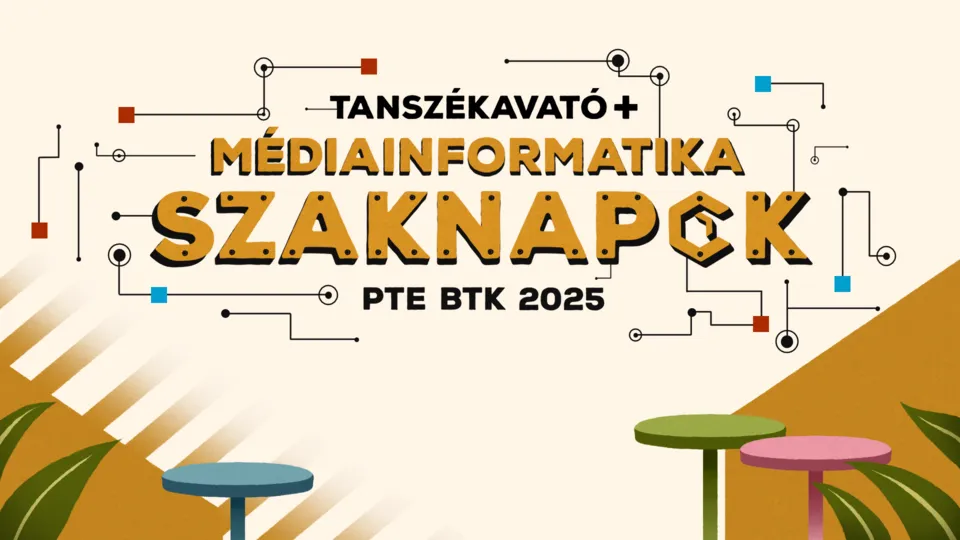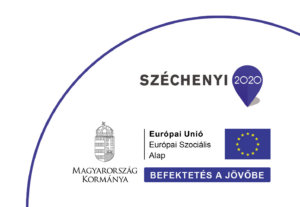
Intro – Bence, Dorka
April set off with an unusual amount of enthusiastic vibrancy in the air around our department, as the semester that had been crawling ever so slowly had suddenly taken up a brisk pace, which meant that suddenly, deadlines and exams got dangerously close. But before the inevitable, we had one more important event to partake in, with programmes made just for us to enjoy: the long-awaited Department Days!
The three-day-long event brought some extra liveliness to the yellow-painted corridors with its engaging workshops, thought-provoking presentations and community get-togethers in many ways. Here, you can read about some of them.
Photo report from Colombia – Marco
On Wednesday afternoon, the audience embarked on a special cultural journey as Levente Radosnai, an assistant lecturer from our department, gave a presentation about his stay in Colombia. During the event, participants gained a comprehensive insight into the country’s diversity, as well as its natural and cultural treasures.
In his presentation, he gave a detailed retelling of how the legend of El Dorado is linked to Lake Guatavita, and introduced Colombia’s remarkably rich biodiversity, shaped by its unique geography. He also emphasized the role of colour in everyday life, highlighting how Colombian society proudly displays the national flag’s colours (yellow, blue, and red) across urban spaces, clothing, and the arts alike.
The report paid special attention to Bogotá, nicknamed ‘the city of bricks’, as the photos clearly demonstrated. Finally, the presentation turned to Colombia’s rich gastronomy, filling our hearts with the sights of BBQ, tropical fruits, and fresh vegetables.
It was a unique experience to hear Levente’s stories about a land so far from us, brought to life by his spectacular photos - and, of course, he made us all just a little hungry with his many exotic food recommendations.
Seminar: Data Journalism - Sára
On April 3rd, our journalism teacher, Éva Varga, held a seminar on Data Journalism as part of the Department Days. The lecture served mostly as an introduction, due to the time limit and the complexity of this form of journalism.
Data journalism is currently a very popular and common format in the news industry, due to its ability to visualize information, making complex data easier to understand. Smart charts, such as diagrams and graphs, show numbers at scale, often having interactive features, so that readers can zoom in on specific data points or choose variables. The written sections provide additional context, but the charts contain most of the information.
Explaining this can be as complicated as understanding the dry numbers themselves, but Éva thankfully took a different approach to help us truly understand the role of visual data. We split into groups, selected recent articles with interactive figures and illustrations for analysis, and examined them using guiding questions and knowledge from our previous studies. Later, we discussed our observations and ideas about the format.
It was a beneficial experience, helping us understand how relevant and useful this type of article is in today’s news reading and writing.
Lecture: „How do large language models work?” - Barna
During Department Days, my Thursday started with a very interesting lecture on large language models (LLMs) by the assistant lecturer at the PTE TTK institute of mathematics and informatics, Róbert Karsa.
We heard a brief presentation about large language models, machine learning, and recent developments in the field of AI. It was both intriguing and a bit terrifying to hear about how far AI technology has come in the recent year alone in the fields of text- and art generation. After the presentation, Karsa gave the participants a chance to experience these developments firsthand: he gave a detailed list of the most dominant AI platforms, such as ChatGPT, Google Gemini, and Perplexity. He also showed some prompting techniques that make communication between humans and AI easier.
It was interesting to see how much effort can go into prompting when done professionally. In my opinion, the most interesting part of the lecture was the introduction of Perplexity’s deep research function. It can collect data from all over the internet and write a research report based on it, complete with a detailed bibliography.
When I saw what it can do in a matter of seconds, when something like this took me weeks during the writing of my thesis, I was both fascinated and terrified by it. It can both be a tool that could be much help to me on my future academic journey, or it can be something that turns academic papers into rushed “publish or perish” mass products.
This, however, is not today’s problem, because this relatively new AI function still has its limitations: for example, when looking at the bibliography, I noticed that it can’t differentiate scientific sources from casual sources and its writing style is sometimes too casual. But with the rapid pace of AI development, who knows how long it will be before it can produce a complete scientific paper indistinguishable from one written by a human.
Overall, it was an intriguing lecture that left me with a lot of questions and a motivation to learn more about the topic.
Debate Game – Luca (translated by Dorka)
Everyday communication often leads to disagreements, so it is important for future communication experts to learn to recognize and avoid such situations.
On the Department Days two smaller groups made up of the faculty’s students could try their hand at this very task with the debate game called ‘VoxPop’. In this game the lucky groups got to make educated arguments on a multitude of topics in a playful environment. The two volunteers who introduced the game to them are part of the ‘Power of Humanity Foundation’ (Emberség Erejével Alapítvány). One of the two is currently a student herself at our school.
The game is played as follows: The players make a choice on whether they agree with a controversial statement or not and position their cards according to it. Pro and contra arguments must be made and positioned on an “opinion line”, which looks like a ship. But the ship must be balanced to not topple over! Sometimes this means that players must argue against their own beliefs.
Coming up with arguments due to these circumstances can be difficult - this is where the argument monsters (such as the slippery slope or straw man) come into play. They are based on common fallacies, and they help the players learn how to make outstanding arguments by avoiding them.
The students at the event got the hang of the game quickly, although they used vastly different strategies. One group relied on mostly facts and statistics to back their points, while the others preferred more light-hearted logic to their advantage. What they all needed to get used to was expressing their opinions in one concise sentence. Learning this only took a few tries, and slowly even the argument monsters lessened in numbers.
Although the students seem to have enjoyed the event, we hope they brought something home other than just smiles. Remembering what they learned could prove crucial later in life.
Bookish Q&A - Sára
Viktória Vörös is a bestselling YA (young adult) author. She has already published three books and is currently working on her next one. She had a Q&A panel on the Department Days - since she’s not only a successful author, but also a fellow communication student in her second year!
It was a moderated talk, starting with some casual conversation about her recent work, future plans, and a look back at when and why she started her writing journey. According to her, she began writing at a young age, and over time it became a huge part of her life.
Her stories are mostly set in a university environment and written in a contemporary romance style and genre, but she is actively adding more serious topics and storylines to her books for deeper meaning. She also likes to include her own personality traits in her characters.
One of my favourite things she mentioned was that anything can be an inspiration for her stories - she’s very open-minded and pays attention to detail. Seeing her popularity, it certainly works for her.
Discussion: “Wandering Concepts” – Fanni
On Thursday afternoon, the ‘Faculty Council Hall’ (Kari Tanácsterem) hosted a discussion on the latest issue of the academic journal ‘Media Researcher’ (Médiakutató), titled “Wandering Concepts” (Vándorló Koncepciók), held as part of the Department Days.
After a few minutes of refreshment in the faculty garden, we gathered on-site to immerse ourselves in the world of crime fiction, comics and popular television series from a media perspective. As suggested by the title of the journal issue and the event, the themes revolved around the duality of globalism and localism, and the main question was how Hungarian communication and media studies can contribute to the global research of socio-cultural processes, using current conceptual frameworks and methods, while adapting them to the local context.
The moderator of the discussion was our department’s professor, Zsolt Szijártó; the organiser of the conference on which the articles of the issue were based and guest editor of the journal Médiakutató. We heard intriguing presentations from different angles around the given concept, starting with an introduction to the role and potential impacts of the crime genre in the Hungarian literary scene by Sándor Kálai from the University of Debrecen. This was followed by a lecture on a German-language graphic novel which tells the story of a former guest worker’s life in the GDR, presented by the collaborative duo of Kata Murányi and Gyula Maksa from the University of Pécs. The finale of the discussion was led by Annamária Torbó from our department, who took us into the depths of ethnic minority representation in Netflix’s series Bridgerton, and the local Hungarian discourse surrounding the phenomenon.
Personally, I had only read this latter article from the issue so far, which made it easier for me to engage with the topic. I found it particularly interesting to learn about how various Hungarian journalistic outlets reported on Bridgerton, with a wide range of opinions shaped by their political orientation.
Leaving the room, we found ourselves debating the points of the discussion, which even led to further exchanges as we headed to the top floor for the 'pub quiz' - a perfect event to let off steam together after such a serious conference. Serious indeed, but also certainly fun for those who enjoy listening to different personalities explore the depths of seemingly ordinary topics.
Pub Quiz – Marco, Fanni
Thursday's events were rounded off with a scientific quiz to test participants' knowledge on the research work of our professors. Alongside the questions, a great atmosphere was guaranteed throughout the evening. The game’s host, our department’s assistant lecturer Márton Bagyura, guided the teams through the quiz night like a true showman - the room echoed with laughter all evening. We got even louder after a few glasses of wine.
Three student teams competed, and the winners were the first-year students’ group. It was funny, and sometimes even surprising, to guess which question belonged to which lecturer. What made it even better was that some of our professors also joined the quiz, listening to our (occasionally very wrong) guesses about their research.
After announcing the results, the podium winners were happy - while the others received a card saying: "Maybe some other time!"
Even after the program ended, the clinking of glasses carried on until dawn. It was a perfect night to come together as a community - and once again, our dear professors proved that being cool is absolutely part of the curriculum.
Graphic design: Dorka Szabó
